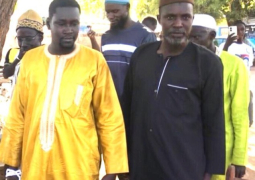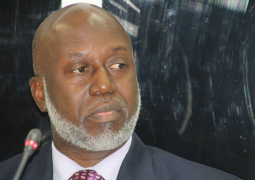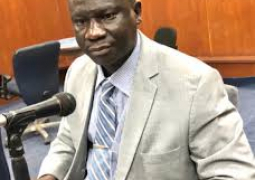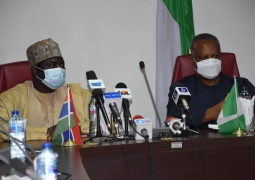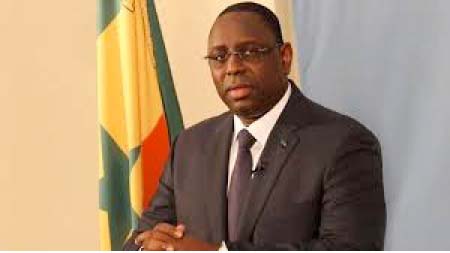
Three months after the proclamation of the state of emergency on March 23, 2020, I would like to share with you the progress made and our perspectives in our fight against the coronavirus pandemic, COVID-19.
This struggle, each and every one of us bears the cost, because we are waging it together, in unity and solidarity, thanks to the synergy of our efforts.
This is why I would first like to thank all the vital forces of the Nation which have enabled this symbiosis:
• the National Assembly, majority, opposition and non-attached members combined;
• the Government and the other Institutions of the Republic;
• local authorities, social partners, the private sector, religious guides, customary chiefs, civil society and citizens' movements.
I express our gratitude to the friendly countries and to the multilateral partners who support our efforts.
I salute the remarkable work of the media which contributes to raising awareness of the disease and the means to combat it.
I strongly encourage our students in the exam classes, their teachers, the supervisory and support staff who have returned to school.
When I addressed you on March 23 to declare a state of emergency, there were more than 340,000 people affected by the COVID-19 pandemic in the world, including more than 15,000 who died.
Our country had a total of 79 patients, 8 cured, zero deaths and 71 patients on treatment.
As of today, the disease has affected more than 10,100,000 people worldwide and caused more than 502,000 deaths.
Our country totals 6698 people tested positive, including 4341 cured, 108 deceased and 2248 currently under treatment and one patient evacuated.
I pray with you that our dead will rest in peace and that our sick will recover their health.
Despite the increase in the number of positive cases, our health system continues to show its capacity for resilience and adaptation in the reception and treatment of patients.
Our performance in the anti COVID-19 response is indeed considerable:
To date, the SAMU has received more than 726,000 emergency calls.
We performed more than 78,338 tests. 24,824 contacts were followed up by our services.
The fatality rate in Senegal is 1.5%, compared to an African average of 2.5% and 5.2% worldwide.
Senegal has a cure rate of 64.8%, compared to an African average of 48% and the world average of 50%.
Nationally, statistics show that the main foci of the pandemic are mainly located in the regions of Dakar, Diourbel and Thiès, which account for 92% of contamination cases.
The Department of Dakar alone totals 54% of the cases recorded throughout the national territory.
In these three regions, it is therefore necessary to redouble our vigilance and our efforts to stop the spread of the disease by intensifying local campaigns.
Once again, I would like to express our gratitude and pay tribute to our remarkable medical and para-medical corps and the support staff, for their competence, their commitment and their availability.
I reiterate our thanks to the other State Services mobilized in the response, to our dynamic and dedicated Territorial Administration and to our valiant Defense and Security Forces deployed within the framework of the state of emergency.
Despite our performance in the health response, however, I must insist that the fight against the pandemic is not yet over. The disease is still there and all projections show that the virus will continue to circulate in the months to come.
Our Health Services and all the other actors mobilized in the anti COVID-19 response give the best of themselves.
But ultimately, the outcome of our struggle against our common enemy will depend, in large part, on our own individual and collective behavior.
We must, therefore, redouble our efforts in attitudes that prevent the spread of the virus: wash your hands frequently, respect physical distance, avoid unnecessary gatherings, limit movement and wear the mask correctly.
It is established that wearing a mask considerably reduces the circulation of the virus; and I remind you that it is compulsory in all public spaces, workplaces, public and private, transport and shops.
In this united front that we are leading against this terrible plague, wearing a mask is both a measure of protection for oneself and one's neighbor; but also an act of civility and a patriotic commitment to the Nation.
I therefore call for the mobilization of all, for the respect of barrier gestures and the systematic and correct wearing of the mask.
I urge local elected officials, social partners, the private sector, religious guides and customary chiefs, civil society and citizens' movements to continue their alert, monitoring and awareness-raising activities in our towns, villages, our neighborhoods and our communities.
Let us pay particular attention to the elderly and those suffering from certain pathologies, because they are the most vulnerable to severe forms of the disease.
I call, once again, not to stigmatize COVID-19 patients.
A patient deserves compassion, not stigma. To stigmatize a patient is to add suffering to suffering; it is to offend the socio-cultural and religious values that teach us to treat others as we would like to be treated; and not to do to others what we wouldn't want to be done to us.
My dear compatriots,
In addition to being a major health crisis, the COVID-19 pandemic is severely affecting the national economy. According to the latest estimates, our economic growth rate would drop from 6.8% to 1.1% or even less.
Several sectors of the economy such as air transport, tourism, hotels, catering, culture and leisure, crafts and trade in agricultural products, are at a standstill, or slow.
That's why i set up the Response and solidarity fund against the effects of the pandemic COVID-19, FORCE-COVID-19, endowed with 1000 billion FCFA, to finance the Economic and Social Resilience Program.
This Program, which aims to strengthen our health system and support our households, our diaspora, our businesses and employees, is being implemented.
On the health component, the Program enabled us to quickly implement our pandemic response strategy, by:
• the massive purchase of medical equipment and products;
• the substantial upgrading of the existing health platform, the fitting out and equipping of new epidemic treatment structures, ie 33 Centers spread across the country;
• finally, the care of the sick and confined people.
We will reinforce these achievements.
Thus, in the 2020-2021 sequence, the State will recruit 500 doctors and 1000 health professionals, in particular nurses, midwives, as well as support staff. In the case of doctors, priority will be given to remote districts and specialists.
In addition, the Government will put in place, over the period 2020-2024, an ambitious strategy for the modernization of the health and social action sector, through the Investment Plan for a health and social action system resilient and sustainable, including a component dedicated to telehealth. This Plan will soon be adopted at a Presidential Council.
With regard to household support, in addition to the assumption by the State of the electricity bills of subscribers of the social group, for a two-month period, the distribution of basic necessities has been underway since April 11.
This large-scale operation, never carried out, required the mobilization of more than 4,000 trucks to deliver aid to 1,100,000 households throughout the national territory, or approximately more than half of the population.
To date, of the 552 municipalities in the country, 438 have completed distribution; the rest of the operations are underway in 114 municipalities, i.e. a completion rate of
79.34%.All distribution must be completed by July 15 at the latest.
Specific quotas will be allocated to drivers of interurban transport (14,000 kits), refugees (4,262 kits), holders of Equal Opportunity Cards (54,219 kits) and people omitted from the National Family Security Bursary Program (42. 650 kits).
Regarding support for the Diaspora up to 12.5billion FCFA, the platform open for this purpose has registered more than 200,000 registrations from 142 countries. 60,000 requests have already been met. Operations continue with the third and final phase.
In addition, the Government has facilitated the repatriation of 3,505 compatriots stranded abroad by the closure of air borders. Flights will continue for around twenty countries, until July 3.
On behalf of the private sector, the Economic and Social Resilience Program has enabled:
• payment of claims from the private sector on the State in the amount of 122 billion FCFA;
• extension of maturities at the bank level for an amount of 135 billion FCFA;
• and the operationalization of the financing mechanism from which the beneficiary companies have thus been able to obtain cash credits at preferential rates, for an amount of approximately 10 billion FCFA.
This mechanism helps cover incompressible costs to maintain 5,374 jobs.
Finally, the Delegation for Fast Entrepreneurship of Women and Youth supported the fishing sector with CFAF 15.8 billion, co-financing for the acquisition of agricultural equipment, the making of 10 million masks and the trade in horticultural products threatened by the crisis, in particular cashew, onion and mango.
With its partners, the DER is also working on structuring a financing of 12 billion FCFA in support of animal husbandry and the agricultural campaign.
My dear compatriots,
For the past three months that we have been fighting the COVID-19 pandemic, we have fully measured its effects, through lost loved ones, our hospital patients, our deeply disturbed social life and economy.
Despite all these difficulties, we must remain upright, combative and count on our own strength first in a struggle on two fronts: that of health and that of the economy.
This is the challenge that we must now take up: to fight to preserve our lives and our health, and to resume all our productive activities to fully restart our economy.
Just as we cannot leave our lives and our health to the virus, nor can we leave the life and health of our economy to it.
So, my dear compatriots, taking into account this double vital necessity, I have decided to lift the state of emergency and the related curfew from tomorrow, June 30, 2020 at 11 p.m.
The office schedule, which had been set up for the Administration from 9 a.m. to 4 p.m. since the relief of the state of emergency in May, is restored to its normal sequence, from 8 a.m. to 5 p.m., with the usual break 1:30 to 2:30 p.m.
The closure of public markets one day a week for cleaning remains in effect.
Because of the high risk of spreading the virus they present, places hosting closed-door leisure activities will remain closed.
The reopening of the air borders will take place from July 15; and international flights will resume according to a defined health protocol.
The land and sea borders remain closed until further notice.
From now on, we must also anticipate and organize ourselves by preparing for the post COVID-19 era. To this end, the Government will soon submit to me a National Economic Recovery Program on which it is already working.
This Program will be based on our productive bases, including agriculture, which benefits for this campaignexceptional budgetary resources of 60 billion FCFA, against 40 billion for the previous one.
Likewise, the World Bank has provided funding of $ 150 million to support strengthening agricultural resilience and productivity.
This project will help increase the export of high value-added crops, including the horticultural sector, improve the productivity of dairy farming and reduce the mortality rate of small ruminants.
All these efforts consolidate our quest for food self-sufficiency. This crisis makes more evident the need to achieve this objective as quickly as possible, by producing more and transforming our agricultural, livestock and fishing products more.
As I indicated in my message of May 11th, the stimulus programof the national economy post COVID-19, will also support the creative initiatives developed within the framework of the fight against the pandemic and the promotion of the national pharmaceutical industry.
At the same time, we will continue and adapt PES reforms and projects, strengthen our territorial equity policies and consolidate the industrialization process started in Industrial Parks and Special Economic Zones, including Agropoles.
I particularly want the state and its branches, including companies with public participation, as well as the private sector to value more local content in the public order of goods and services.
But all, together, we must make consuming Senegalese not an effect of fashion or conjuncture, but the affirmation of a true culture of economic sovereignty. We need to further develop a state of mind capable of permanently establishing a culture of Senegalese produce and consume!
My dear compatriots,
By lifting the state of emergency, I would remind you at the same time that the health emergency is still there and imposes a duty on us: duty of vigilance, duty of individual responsibility and duty of collective responsibility.
The danger is still there, and we must continue the struggle.
So, my dear compatriots, let's protect ourselves, protect our families, our communities and our country, so that Senegal can live, in good health, in peace, stability and prosperity. Good evening.
Read Other Articles In Headlines
